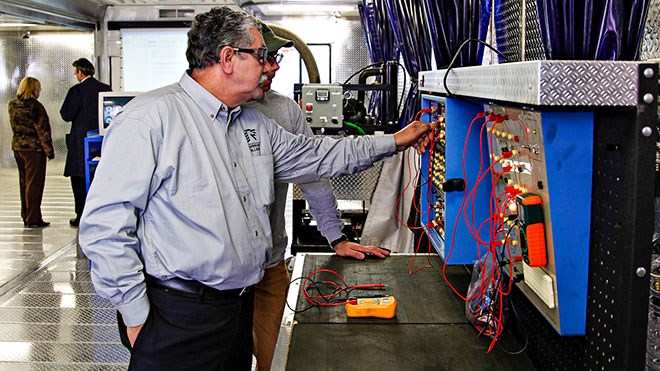The Cambrian College trades trailer has been extending the school’s offerings to remote communities for seven years, and just rolled back into Sudbury after another busy season.
The trailer spent the summer in Wikwemikong First Nation on Manitoulin Island, bringing college courses closer to home for students who want to pursue the trades.
“The intent was to be able to offer college programs in remote communities and in particular Indigenous communities,” said Richard Ouellet, the director of Cambrian’s Wabnode Centre, which brokers many of the agreements with First Nations that access the trailer.
The trades trailer was a gift from Sudbury miner Vale to the college in 2009, and has proved popular in the years since it was introduced, making its way through the North’s communities.
“It’s pretty much always used,” said Ouellet. “Over 200 students have gone through in the life of the trailer.”
The trailer is broken down into three separate units, which, when put together, form the 1,000-square-foot space stocked with welding bays, carpentry machinery or whatever equipment is required for a specific module or course.
“It’s really difficult to find the shop space with health and safety requirements. There’s got to be a certain kind of wiring and insulation, and that’s what the trailer does. It meets all those requirements,” said Ouellet.
The students using the equipment get to learn near home, but the professionals who teach in the trailer are often sourced from the communities as well.
“We hire people from the area. So, if for example, we’re offering a pre-trade course in the trailer, our preference would be to hire someone local, but that’s not always an option. Preferably they’re red seal and they meet the Ontario college requirements to be an instructor,” said Ouellet.
Popular programs include specific training in mining and the more general pre-trades programs.
In 2013, for example, the trailer headed to Constance Lake First Nation for a mining essentials course that 16 young students took specifically in anticipation of jobs in the Ring of Fire region.
On the other hand, the pre-trades program is more about familiarizing students with what college is like, and helping them decide whether they would like to pursue it full time.
“What it does is it gets them to experience a post-secondary course at home, and it helps them to decide to pursue post-secondary. So, for example, if we’re taking pre-trade, you get a certificate but really it’s an intro to the other trades,” said Ouellet.
However, Ouellet said he’d like to see full programs offered by the trailer in the future, rather than individual courses.
“The challenge with the trailer is we haven’t come across an agreement where entire programs are being offered, so I think there’s a need to increase the use of trailers or something similar so a lot of the programming that will happen will be a certain certificate or diploma,” said Ouellet.
For now, once the trailer has undergone its routine maintenance, it will be back on the road. And it seems the trailer is garnering interest beyond Northern Ontario.
“There is definitely a growing interest. A number of other people are thinking of getting trailers, especially other training institutes,” said Ouellet.




